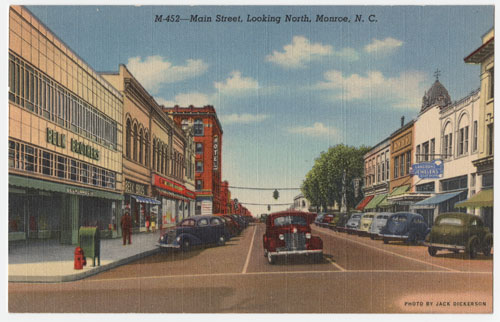Belk
 Charlotte-based Belk, Inc., the nation's largest privately owned department store organization, began in Monroe in 1888 as one small store named the New York Racket. The 25-year-old founder, William Henry Belk, who had worked in the dry goods trade in Monroe since he was 12, invested his life savings of $750, borrowed $500, and used $3,000 of consigned merchandise to launch his store. It realized a profit in its first year of operation, largely because of Belk's innovative business techniques. He insisted that all merchandise bear clearly marked prices-no haggling-since sales were cash only. No credit or barter terms were allowed, although customers were guaranteed a full refund on any purchase if later dissatisfied. These principles were unusual in 1888, when North Carolinians were poor and struggling during the post-Reconstruction era. The store opened early and closed late to accommodate the lifestyle of the working-class customer. Economical or "bargain" items were always stocked. Advertising was another concept Belk introduced in the retail trade to his advantage.
Charlotte-based Belk, Inc., the nation's largest privately owned department store organization, began in Monroe in 1888 as one small store named the New York Racket. The 25-year-old founder, William Henry Belk, who had worked in the dry goods trade in Monroe since he was 12, invested his life savings of $750, borrowed $500, and used $3,000 of consigned merchandise to launch his store. It realized a profit in its first year of operation, largely because of Belk's innovative business techniques. He insisted that all merchandise bear clearly marked prices-no haggling-since sales were cash only. No credit or barter terms were allowed, although customers were guaranteed a full refund on any purchase if later dissatisfied. These principles were unusual in 1888, when North Carolinians were poor and struggling during the post-Reconstruction era. The store opened early and closed late to accommodate the lifestyle of the working-class customer. Economical or "bargain" items were always stocked. Advertising was another concept Belk introduced in the retail trade to his advantage.
Belk depended on the small profit on the overall volume of sales rather than on individually sold items. The New York Racket thrived, and in 1891 Belk convinced his brother, John Belk, a medical doctor practicing in nearby Anson County, to join him as a partner in the management and operation of the retail business. The store underwent a formal name change to the Belk Brothers Company as a result of this partnership.
In 1893 a second Belk Brothers Company store opened in Chester, S.C. The Monroe store remained the operational center of the expanding Belk Brothers Company until 1895, when the fourth and largest Belk's opened in Charlotte. Other Belk stores opened during the early twentieth century, often in partnership with former employees who had gained experience and established their own stores with the help of Henry Belk. Among these were the first Parks-Belk Company, opened in Concord in 1911; the first Hudson-Belk Company, opened in Raleigh in 1915; the first Belk-Stevens Company, opened in Winston-Salem in 1916; and the first Gallant-Belk Company, opened in Anderson, S.C., in 1919.
In the second half of the twentieth century, Belk modernized and expanded its retail trade. Beginning in the 1950s, Belk developed a private label program that launched successful brands such as Archdale shirts for men, Sweetbriar clothing for women, and Nursery Rhyme for toddlers and infants. The traditional Belk principle of no credit ended in 1967, when the first Belk-only credit card was issued, valid at all Belk stores. Mail-order sales, sophisticated computerization of the merchandising system, and modern managerial techniques followed. In the 1970s Belk continued the dominant modern trend of the retail trade by locating stores in shopping malls.
In 1998 Belk consolidated all of its stores into one corporation, Belk, Inc. Behind-the-scenes cost cutting helped Belk avoid a national trend among retailers in the first quarter of 2002 by achieving record income. In early 2005 Belk, Inc., still owned and operated by William Henry and John Belk's descendants, had 275 stores in 16 southeastern, mid-Atlantic, and southwestern states, employing 17,900 people and posting annual sales of more than $2.5 billion.
References:
Henderson Belk, Early Belk Partners: Ordinary People Who Did the Extraordinary (1994).
Howard E. Covington Jr., Belk: A Century of Retail Leadership (1988).
Additional Resources:
Belk, Inc.: http://www.belk.com/
"Main Street Merchant," Our State, Decemer 2010. https://digital.ncdcr.gov/Documents/Detail/our-state/1125523?item=1125610
Image Credit:
Post card featuring Belk Brothers in Monroe, North Carolina. Image available from UNC Libraries. Available from http://www.lib.unc.edu/blogs/ncm/index.php/2012/05/29/on-124th-birthday-of-first-belk-store-wheres-belk/ (accessed June 12, 2012).
1 January 2006 | Furr, J. Elizabeth